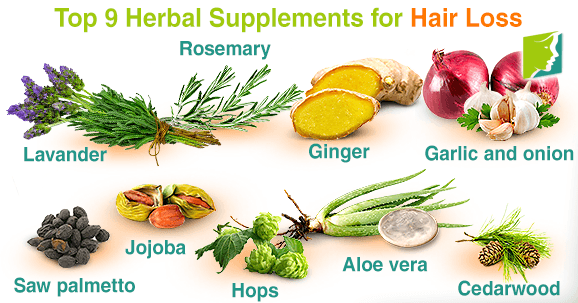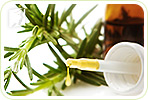Every strand of hair rests in a tiny holy in the skin, called a follicle. Hair loss occurs when hair follicles shrink over time, causing thinner, shorter hair. On average, the scalp sheds up to 100 hairs per day. The body naturally replaces those hairs, but has more difficulty doing so with age. There are several factors that trigger hair loss, such as hormone fluctuations and stress. Additional causes of hair loss include damaging hair with harsh chemicals and excessive styling with hot tools. This article features the top herbal supplements for hair loss.
Lavender
This soothing herb gently cleanses dull hair and increases shine. Lavender oil also soothes the skin, and it is antibacterial, which helps treat irritations and infections. Lavender nourishes the scalp and helps remedy dryness and dandruff. The soothing scent of lavender is also known to reduce tension and stress.
Rosemary
Rosemary oil nourishes hair follicles, strengthens hair, and reduces hair thinning. It also helps stimulate circulation in the scalp, and gently removes excess sebum and dandruff, promoting hair growth.
Ginger
Ginger is high in nutrients and antioxidants, and is also anti-inflammatory. It is a well-known herb for its numerous medicinal benefits, and that includes its promotion of hair growth.
Garlic and Onion
Garlic juice is known to promote hair growth and improve follicle health, while onion juice nourishes hair follicles and increases circulation, which promotes growth. Onion, especially the red type, also contains antioxidants. One study showed that applying onion juice two times a day caused hair regrowth in almost 90% of subjects in approximately six weeks' time.
Saw Palmetto
This herb stops testosterone from converting into dihydrotestosterone, which is the compound that is linked to thinning hair. Saw palmetto is available in supplement form at most nutrition shops and health food stores.
Jojoba
Jojoba oil is commonly used in shampoos and for hot oil treatments because it is believed to stimulate hair growth. It is anti-inflammatory and soothing in nature, and it is useful for unclogging pores.
Hops
Hops naturally conditions hair and also contains silica, which fortifies hair from within.
Aloe Vera
Aloe gel opens up blocked pores of the scalp to prevent infection and clear the way for new hair to grow. It has been used since Mesopotamian times to treat hair loss in many different cultures.
Cedarwood
Cedarwood essential oil - when mixed with jojoba, thyme, lavender, and rosemary - has been shown to promote hair growth. It is mainly effective for managing alopecia areata, a genetic form of hair loss.
These natural herbs work best as oil extract, warmed up, and gently massaged onto the scalp. The warm, soothing oils nourish and stimulate the scalp, promoting healthy hair growth, and providing protection to the hair and follicles. All of these herbs can be easily found at any herbal nutrition shop or health food store. Read useful information about menopausal hair loss treatments.
Sources
- Bhat, G. , Kudva, P. & Dodwad, V. (2011). Aloe vera: Nature's soothing healer to periodontal disease. Journal of Indian Society of Periodontology, 15(3), 205-209. doi: 10.4103/0972-124X.85661
- Hay, I.C. , Jamieson, M. & Ormerod, A.D. (1998). Randomized trial of aromatherapy. Successful treatment for alopecia areata. Archives of dermatology, 134(11), 1349-1352. Retrieved from http://www.ncbi.nlm.nih.gov/pubmed/9828867
- Murata, K. et al. (2013). Promotion of hair growth by Rosmarinus officinalis leaf extract. Phytotherapy research, 27(2), 212-217. doi: 10.1002/ptr.4712
- National Center for Complementary and Alternative Medicine. (2012). Lavender. Retrieved June 25, 2014, from http://nccam.nih.gov/health/lavender/ataglance.htm
- National Institutes of Health. (2014). Hair loss. Retrieved October 21, 2014, from http://www.nlm.nih.gov/medlineplus/hairloss.html
- Office on Women's Health. (2008). Skin and Hair Health. In: The Healthy Woman: A Complete Guide for All Ages. Retrieved from http://www.womenshealth.gov/publications/our-publications/the-healthy-woman/skin_hair.pdf
- Sharquie, K.E. & Al-Obaidi, H.K. (2002). Onion juice (Allium cepa L.), a new topical treatment for alopecia areata. The Journal of Dermatology, 29(6), 343-346. Retrieved from http://www.ncbi.nlm.nih.gov/pubmed/12126069




